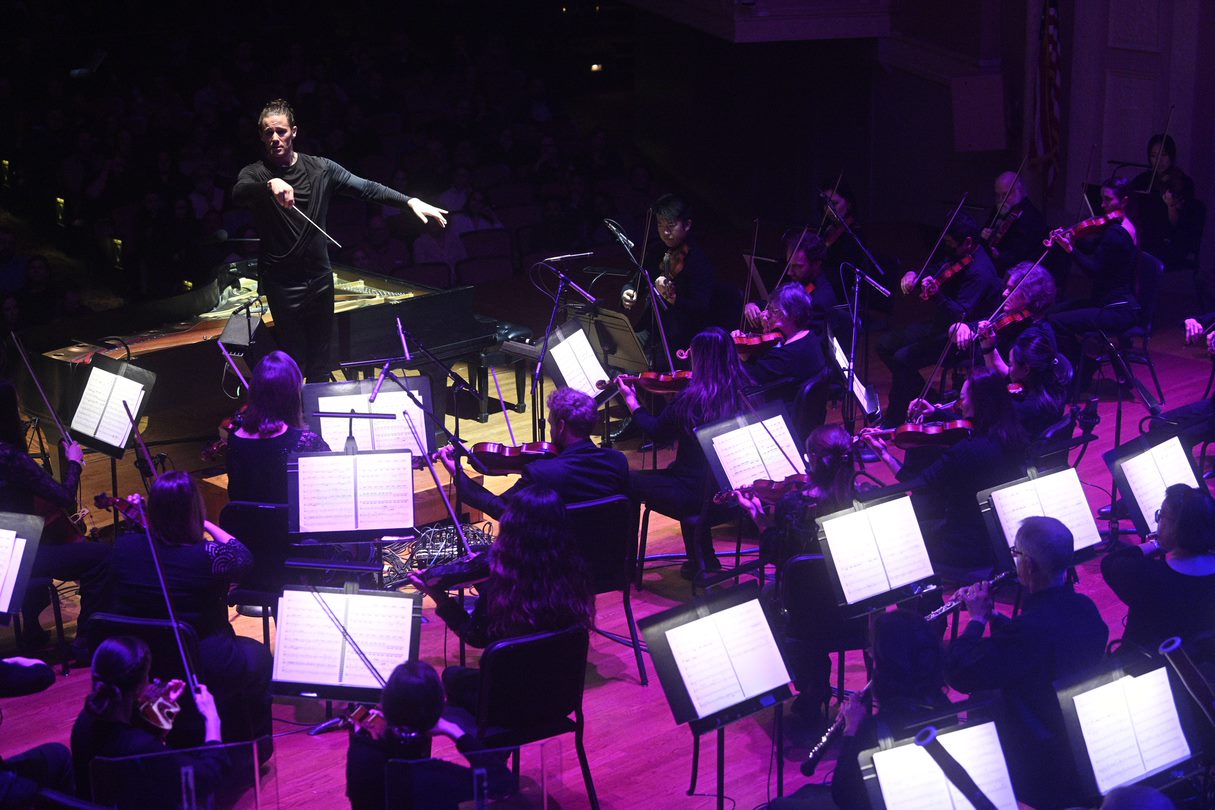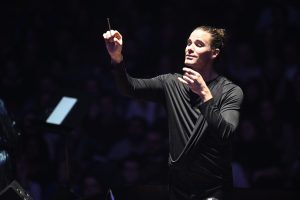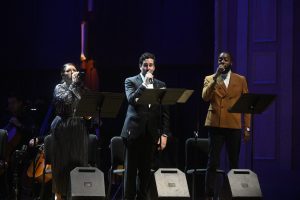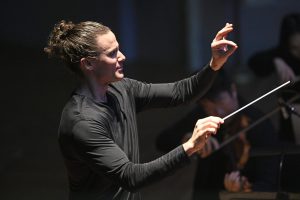
Steve Hackman & The Indianapolis Symphony Orchestra – Courtesy of Tom Russo. Used with permission.
If ever there were a recipe for success in attracting younger audiences to a symphony concert, it would be the programming of hybrid music composed by the enterprising Steve Hackman. Proof of that was more than evident when Hackman’s “Beethoven X Coldplay” was performed by the Indianapolis Symphony Orchestra to a sold-out audience of mostly 30 to 40 somethings at the Hilbert Circle Theatre on Wednesday, Jan. 25. Also conducted by Hackman, the concert was part of the ISO’s Unchartered Series.

Steve Hackman – Courtesy of Tom Russo. Used with permission.
While at the podium welcoming the enthusiastic crowd, Hackman conducted a vote when he asked the crowed to clap for either Beethoven or Coldplay when he said their names. The applause for Beethoven was only slightly louder than that for the British rock band whose music Hackman fused with the German composer’s celebrated “Symphony No. 3, Eroica.”
Originally dedicated to Napoleon Bonaparte, with whom he later became disenchanted, Beethoven eventually subtitled his composition “Eroica” for its supposed heroic nature. The grand and dramatic “Symphony No. 3” premiered in Vienna on April 7, 1805. It is made up of four movements: I. Allegro con brio; II. Marcia funebre: Adagio assai; III. Scherzo: Allegro vivace; and IV. Finale: Allegro molto. Composed between 1802 and 1804, the piece is one of Beethoven’s most celebrated works because it broke boundaries in symphonic form, length, emotional and cultural content, and harmony; and it is considered to be the first Romanic symphony.
Known for their sweet and passionate melodies, Coldplay is a British pop-rock band formed in London in 1997. They consist of vocalist and pianist Chris Martin, guitarist Jonny Buckland, bassist Guy Berryman, and drummer Will Champion. Breaking through in 2000 with their “Parachutes” album, Coldplay is considered the most successful band of the 21st century. With over one-hundred-million albums sold globally, they are one of the best-selling artists of all time.

L- R Malia Civetz, Casey Breves & Steve Epting – Courtesy of Tom Russo. Used with permission.
Recently when I interviewed Hackman, I asked him what Beethoven and Coldplay have in common, to which he replied, “. . . it is such universal music. They confront the big themes. The big humanist themes of love and loss and joy, triumph, and failure, and they express it somehow so distinctly in music. That is why I sought to combine them.” And combine them he did convincingly, while leading the impeccable musicians of the ISO, who interpreted his groundbreaking composition magnificently.
Three vocalists, Casey Breves, Malia Civetz, and Steve Epting, all holding impressive credits, sang excerpts from Coldplay songs that were interwoven in Beethoven’s work. Excerpts of Coldplay songs sung during the first movement were “Clocks,” “Politik,” “Every Teardrop Is a Waterfall,” and “Trouble.” The second movement was combined with “The Scientist,” “Princess in China,” and “In My Place.” The third movement was fused with “Paradise” and the fourth with “Vida la Vida” and “Fix You.”
Hackman, a consummate artist, displayed his prodigious talents in multiple. As a conductor, his physical movement was distinctive for its power and elegance, matching the quality of his piano performance when he accompanied the singers in “Clocks,” “Politik,” “Trouble,” and “In My Place.” Hackman also showed off an appealing voice as he sang while accompanying himself on piano during a cadenza between the second and third movement and during “Fix You” which was included in the fourth movement and the concert’s finale.

Steve Hackman – Courtesy of Tom Russo. Used with permission.
Under Hackman’s robust baton, the ISO’s performance of his hybrid masterpiece was seamless and one which entertained, inspired, and moved me viscerally.
At a time when the World War II generation is dying off and Baby Boomer numbers are declining, orchestras all over the world are struggling to attract new and younger audiences to classical music concerts. Hackman leads the charge to redefine classical music by merging it with popular styles and is acknowledged as a bold and visionary pioneer. Also, through his compositions such as “The Resurrection Mixtape” (Mahler X Notorious BIG and Tupac Shakur), Hackman is also attracting people of color to the concert hall. Based on the positive, engaged response of the young, racially diverse crowd that surrounded me at “Beethoven X Coldplay,” I feel encouraged that the enthusiastic reception of Hackman’s groundbreaking work bodes well for the future of classical music and music in general.
For tickets and information about the Indianapolis Symphony Orchestra go to indianapolissymphony.org.





